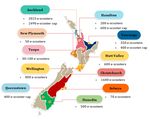New Zealand's Regulatory System for Shared/Rental Micromobility - Presentation by Rosalinda Pierce, Ministry of Transport, New Zealand Roundtable ...
←
→
Page content transcription
If your browser does not render page correctly, please read the page content below
New Zealand’s Regulatory System for Shared/Rental Micromobility Presentation by Rosalinda Pierce, Ministry of Transport, New Zealand Roundtable on Micromobility, Equity and Sustainability 17-19 March 2021
New Zealand’s Regulatory System for Shared/Rental Micromobility March 2021 | Prepared by Rosalinda Pierce for the ITF Roundtable
NOT GOVERNMENT POLICY
The New Zealand context
► There has been a significant increase in the
number of electric micromobility devices in New
Zealand since 2018.
► Different councils have been trialling the operation
of these devices, predominantly e-scooters,
through permitting commercial shared schemes.
► Initially shared e-scooter schemes received a lot of
bad press and there are still concerns regarding
their cost to the health system
► Despite a bumpy start, shared e-scooter schemes
are now generally accepted as a permanent
feature of New Zealand’s transport systemNOT GOVERNMENT POLICY
The New Zealand context
► Bylaws are used as the primary lever for regulating shared e-scooter schemes, but are not fit-for-purpose
► Most councils use a Trading in Public Places bylaw, despite these not being designed for transport services
► Councils can adjust and create new bylaws, but these reviews are resource and time intensive
► Councils have autonomy to set the regulatory and operating environments for e-scooter companies
► For operators, this is challenging the business model of shared/rental micromobility
► For councils, the autonomy enables them to ensure micromobility is working for their cities
► There is no standardised approach for monitoring and enforcing requirements across different councils
► Operators are responsible for ensuring their devices and riders comply with councils regulations
► Different councils have varying levels of resource and appetite to monitor and enforce regulations
► Councils and operators tend to agree that the regulatory system is functional, but not necessary optimal
► Most councils express desire for more regulation from a central level, but for varying reasons
► Most operators do not want to see more regulation from central or local governmentNOT GOVERNMENT POLICY
Roles and responsibilities
Minister of Transport
Creates the settings that influence actors in the system
Determines policy and strategic direction of the system
Purchases transport infrastructure on behalf of the Crown
Waka Kotahi New Zealand Transport Agency Ministry of Transport
Decides what is and isn’t a motor vehicle Steward and lead of the transport system
Develops and funds national messaging campaigns Advises Minister on how to achieve outcomes
Delivers land transport infrastructure Monitors performance of crown agencies
Territorial Authorities/Local Government/Councils
Sets regulatory and operating environment for operators
Protects amenity value
Co-funds land transport infrastructure with Waka Kotahi
E-scooter companies/Operators Ride Report
Runs micromobility transport service Offers third party data analytics and aggregation
Communicate with riders to influence behaviour Provides councils with trusted data on operators
Comply with regulations (bylaws and codes of practice) Works with jurisdictions and companies globallyNOT GOVERNMENT POLICY
Insights from our research
► There is limited evidence to suggest that there are significant safety issues arising as a result of the current system
that would be addressed by having greater national oversight of operators. However, e-scooters and other
micromobility devices are constantly changing and becoming more sophisticated. If some of the more advanced
features that have been proposed became a reality there may be a greater case for national regulatory oversightNOT GOVERNMENT POLICY
Insights from our research
► There is limited evidence to suggest that there are significant safety issues arising as a result of the current system
that would be addressed by having greater national oversight of operators. However, e-scooters and other
micromobility devices are constantly changing and becoming more sophisticated. If some of the more advanced
features that have been proposed became a reality there may be a greater case for national regulatory oversight
► The overall sentiment from operators was that they understand and appreciate why councils need to be able to
regulate certain aspects of their rental e-scooter schemes, but would like to see more data-driven decision making
and a more partnership style approach to regulation, monitoring and enforcement. However, in some environments
the requirements on operators are so burdensome that they are threatening the viability of rental e-scooter schemes.NOT GOVERNMENT POLICY
Insights from our research
► There is limited evidence to suggest that there are significant safety issues arising as a result of the current system
that would be addressed by having greater national oversight of operators. However, e-scooters and other
micromobility devices are constantly changing and becoming more sophisticated. If some of the more advanced
features that have been proposed became a reality there may be a greater case for national regulatory oversight
► The overall sentiment from operators was that they understand and appreciate why councils need to be able to
regulate certain aspects of their rental e-scooter schemes, but would like to see more data-driven decision making
and a more partnership style approach to regulation, monitoring and enforcement. However, in some environments
the requirements on operators are so burdensome that they are threatening the viability of rental e-scooter schemes.
► Councils see value in central government regulating certain aspects of the system currently regulated by councils, for
example upper speed limits and helmet use, but with councils retaining the existing level of autonomy and flexibility
within those centrally set rules. The extent to which councils would like the regulatory responsibility transferred to
central government depends on each councils’ willingness and ability to monitor and enforce the existing regulations.NOT GOVERNMENT POLICY
Insights from our research
► There is limited evidence to suggest that there are significant safety issues arising as a result of the current system
that would be addressed by having greater national oversight of operators. However, e-scooters and other
micromobility devices are constantly changing and becoming more sophisticated. If some of the more advanced
features that have been proposed became a reality there may be a greater case for national regulatory oversight
► The overall sentiment from operators was that they understand and appreciate why councils need to be able to
regulate certain aspects of their rental e-scooter schemes, but would like to see more data-driven decision making
and a more partnership style approach to regulation, monitoring and enforcement. However, in some environments
the requirements on operators are so burdensome that they are threatening the viability of rental e-scooter schemes.
► Councils see value in central government regulating certain aspects of the system currently regulated by councils, for
example upper speed limits and helmet use, but with councils retaining the existing level of autonomy and flexibility
within those centrally set rules. The extent to which councils would like the regulatory responsibility transferred to
central government depends on each councils’ willingness and ability to monitor and enforce the existing regulations.
► Councils and operators have disparate experiences of the same regulatory system. One of the most fundamental
points of difference is that all operators perceive rental e-scooters as a form of public transport, but are not
subsidised, unlike other forms of public transport. Most councils, however, believe that they are indirectly subsidising
e-scooter operators by not recovering all the cost of managing the permits and monitoring the regulatory environment.NOT GOVERNMENT POLICY
Next steps for New Zealand
Waka Kotahi NZ Transport Agency is progressing work under the Accessible Streets Regulatory Package.
► AS is designed to make footpaths, shared paths, and cycle lanes safer and accommodate the increasing use of
micromobility devices on streets and footpaths. AS will create a national framework clarifying the types of vehicles
and devices that are allowed on footpaths, shared paths, and cycle lanes, and how they can use these spaces.
► This will include a proposed 15km/h speed limit on the footpath and a requirement for all other footpath users to give
way to pedestrians. The rules clarify how road controlling authorities may regulate pedestrians, devices, and spaces
such as the footpath, and propose changes to remove barriers to walking, device use, and cycling.NOT GOVERNMENT POLICY
Next steps for New Zealand
Waka Kotahi NZ Transport Agency is progressing work under the Accessible Streets Regulatory Package (AS)
► AS is designed to make footpaths, shared paths, and cycle lanes safer and accommodate the increasing use of
micromobility devices on streets and footpaths. AS will create a national framework clarifying the types of vehicles
and devices that are allowed on footpaths, shared paths, and cycle lanes, and how they can use these spaces.
► This will include a proposed 15km/h speed limit on the footpath and a requirement for all other footpath users to give
way to pedestrians. The rules clarify how road controlling authorities may regulate pedestrians, devices, and spaces
such as the footpath, and propose changes to remove barriers to walking, device use, and cycling.
The Ministry of Transport is working with councils and Waka Kotahi to develop best practice guidance for the sector.
► This work has commenced this month and will cover best practice approaches to micromobility policies, such as:
► Curb space management (e.g. device caps, parking areas, fees)
► Equity service programmes (e.g. low-income affordability, neighbourhood servicing)
► Enforcement (e.g. protecting private property, revoking operating permits)
► Data standards (e.g. data accessibility, data dashboards)
► This work will also aim to establish an agreed definition of micromobility in New Zealand, and set out its benefits and
opportunities as a transport mode for the future.NOT GOVERNMENT POLICY
Questions for discussion
► Are the roles and responsibilities for regulating micromobility different in your country?
► What do you see as the main challenges and benefits of micromobility?
► Does your country manage privately owned micromobility differently to shared/rental?
► What experiences from your country may be useful for our best practice guidance?You can also read
























































